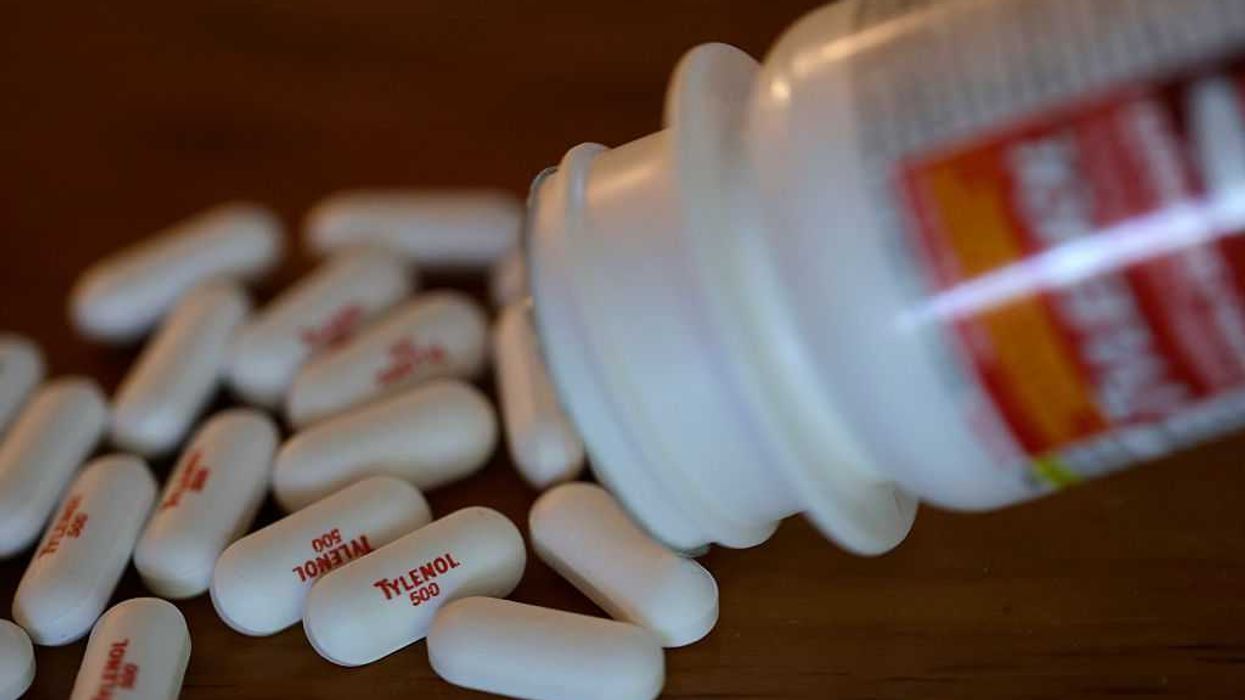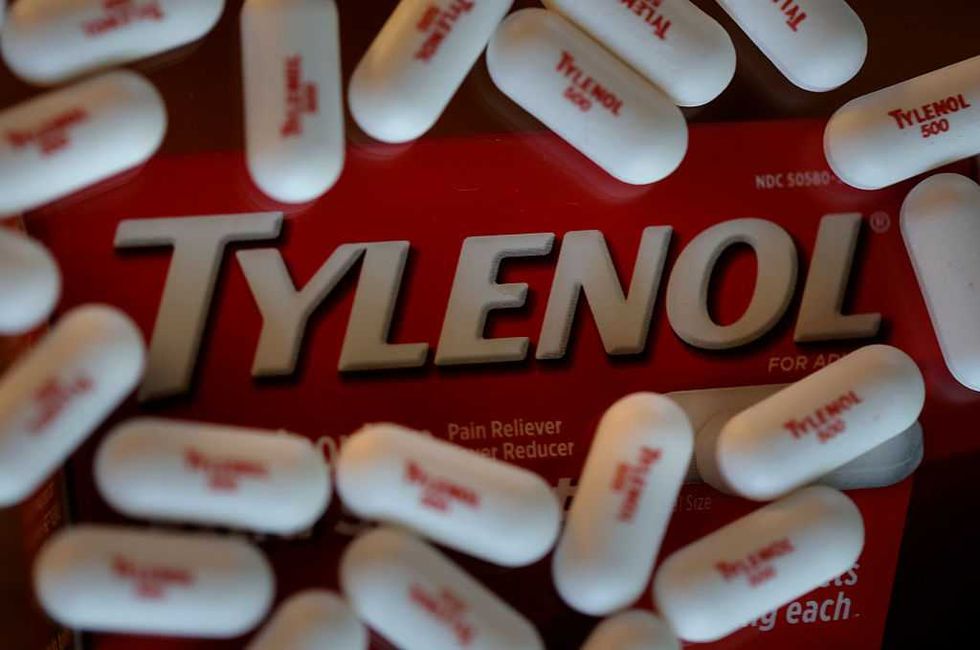
Photo Illustration by Justin Sullivan/Getty Images

Critics of Trump's recent remarks about Tylenol's possible autism link appear more certain about the drug's safety than its makers.
Medical groups, foreign health organizations, and some lawmakers threw a conniption this week after President Donald Trump and Health and Human Services Secretary Robert F. Kennedy Jr. dared to take action over the apparent association between autism and prenatal exposure to acetaminophen, the active ingredient in Tylenol.
A popular tactic taken by critics was to refute a claim the Trump administration wasn't making, namely that acetaminophen was causally linked to autism.
The American College of Obstetricians and Gynecologists, for example, stated, "In more than two decades of research on the use of acetaminophen in pregnancy, not a single reputable study has successfully concluded that the use of acetaminophen in any trimester of pregnancy causes neurodevelopmental disorders in children."
Of course, the point the administration was making concerns the apparent correlation, not causation, between Tylenol use during pregnancy and autism in children — a correlation that has been borne out in numerous studies published in reputable peer-reviewed scientific journals such as Environmental Health, JAMA Psychiatry, Clinical and Experimental Pediatrics, and the International Journal of Epidemiology.
While such studies evidently have not swayed organizations cozy with the pharmaceutical industry, they certainly caused alarm behind the scenes at the very company that made Tylenol for six decades.
Pharmaceutical giant Johnson & Johnson made the acetaminophen product Tylenol available over the counter in 1960. In 2023, J&J spun off its consumer health care division Kenvue as an independent company, which now makes the drug.
Damning internal documents recently obtained by the Daily Caller indicate that years before J&J parted ways with Tylenol, some of its senior scientists admitted that a possible association existed between Tylenol and autism.
RELATED: Fact-check: Tylenol confirms 2017 pregnancy warning tweet is authentic

For instance, when serving as the U.S. director of epidemiology for J&J's pharmaceutical arm Janssen in 2018, Rachel Weinstein noted in an email, "The weight of evidence is starting to feel heavy to me."
After referencing "studies in prenatal exposure and neurodev outcome," Weinstein wrote, "It looks like there are a bunch of papers from 2016 that we somehow missed. Many of them by Liew et al."
One of the papers Weinstein may have been referring to was a study published in the international journal Autism Research. The study indicated that maternal use of acetaminophen for over 20 weeks of pregnancy "increased the risk of [autism spectrum disorder] or infantile autism with hyperkinetic symptoms almost twofold."
The company documents were provided to the Caller by the law firm Keller Postman, which is leading a class-action lawsuit against Kenvue as well as against retailers that sell their own store-branded acetaminophen.
Ashley Keller, lead attorney for the families whose suit will be heard before the Court of Appeals for the Second Circuit beginning on Oct. 9, told Blaze News, "The emails confirm that the company's nothing-to-see-here response to the administration's announcement is pure spin."
"Internally, the company was aware of the growing body of scientific evidence linking prenatal Tylenol use to neurodevelopmental harm in offspring," Keller added.
'There are dozens of studies showing a link between Tylenol and neurodevelopmental harm in offspring.'
Weinstein wrote in a 2014 letter to one of the researchers behind the 2014 study titled "Acetaminophen use during pregnancy, behavioral problems, and hyperkinetic disorders," which was published in JAMA Pediatrics, "We recognize the substantial strengths of the study and the data sources."
That study concluded, "Maternal acetaminophen use during pregnancy is associated with a higher risk for HKDs and ADHD-like behaviors in children."
Referencing her correspondence with the researcher on the 2014 paper, Weinstein and other top J&J scientists considered backing follow-up studies; however, she then noted, "Do we really need to stick our neck out and make this offer?"
Slides for a 2018 internal presentation labeled "privileged and confidential" discussed epidemiological studies concerning potential links between Tylenol and various neurodevelopmental disorders. The slide summarizing the studies under review states, "Individual observational studies show a somewhat consistent association of increased occurrence of neurodevelopmental outcomes with prenatal exposure."
Internal communications further indicate that some J&J employees were reportedly also aware of a 2018 scientific review that indicated nine recent studies had suggested "an increased risk of adverse neurodevelopmental outcomes following prenatal [acetaminophen] exposure."
The Caller indicated that Weinstein could not be reached for comment.
A spokesperson for J&J told the Daily Caller, "Johnson & Johnson divested its consumer health business years ago, and all rights and liabilities associated with the sale of its over-the-counter products, including Tylenol (acetaminophen), are owned by Kenvue."
The current maker of Tylenol, Kenvue, in turn continued downplaying a link between its drug and autism.
"Nothing is more important to us than the health and safety of the people who use our products," said Kenvue spokeswoman Melissa Witt. "We have continuously evaluated the science and continue to believe there is no causal link between acetaminophen use during pregnancy and autism."
When asked about Kenvue's assertion that "there is no credible science that shows taking acetaminophen causes autism," Keller, the attorney representing families in the class-action lawsuit against Kenvue, told Blaze News, "To quote the late, great Justice Scalia: 'Pure applesauce.'"
Alluding to some of the credible science that has been undertaken to date, Keller underscored there is cause for concern.
"There are dozens of studies showing a link between Tylenol and neurodevelopmental harm in offspring. The direct measurement studies that look at biomarkers all show dose response (more Tylenol, more risk)," Keller said. "They also show very elevated odds ratios (double, triple, quadruple, even quintupling of the risk). The animal models, which can control for genetics far better than human observational studies, show that acetaminophen is neurotoxic."
"Does that mean causation has been definitively established? No, it is simply likely," Keller continued. "But even if you only think it is plausible, we shouldn't have to wait for definitive proof of causation before we warn pregnant women of risks."
Like Blaze News? Bypass the censors, sign up for our newsletters, and get stories like this direct to your inbox. Sign up here!